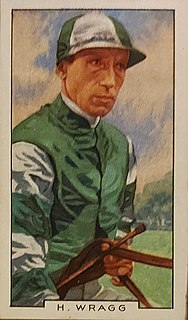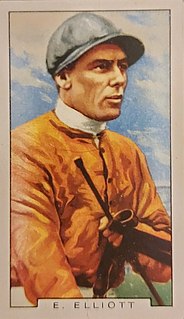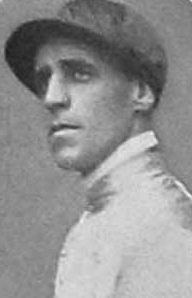The Nunthorpe Stakes is a Group 1 flat horse race in Great Britain open to horses aged two years or older. It is run at York over a distance of 5 furlongs, and it is scheduled to take place each year in August.
Sir Charles Francis Noel Murless was a British racehorse trainer.

Harry Wragg was a British jockey and racehorse trainer, who gained the nickname "The Head Waiter" due to his "come from behind" riding style. In a 27-year riding career, Wragg rode over 1700 winners in Britain and Ireland, including three victories in The Derby and ten in other British Classic Races. He then embarked on a successful 36-year training career, in which he trained many important winners including five more classics. He retired in 1982 and died three years later.
Seb Sanders is a former flat race jockey.
Geoff Wragg was a Thoroughbred horse trainer who trained champion horses such as Teenoso and Pentire. He was the son of former jockey and trainer Harry Wragg, from whom he took over the licence at Abington Place, Newmarket in 1983 upon his father's retirement. Wragg retired in 2008 after 25 years of training and sold Abington Place to Sheikh Mohammed bin Khalifa Al Maktoum the following spring. He relocated to Yorkshire, the birthplace of his late father, Harry Wragg. He died in 2017.

Psidium was an Irish-bred, British-trained Thoroughbred racehorse and sire. In a racing career that lasted from 1960 to 1961 Psidium ran 11 times and won twice. He is best known for his win, as a 66/1 outsider, in the 1961 Epsom Derby. He later became a successful stallion.
Felstead (1925–1946) was a British Thoroughbred racehorse and sire. After failing to show any worthwhile form as a two-year-old he made exceptional improvement as a three-year-old to win the 1928 Epsom Derby at odds of 33/1 in record time. Soon after his win at Epsom, Felstead was injured in training and never ran again. He later had some success as a stallion.
Pont l’Eveque was a British Thoroughbred racehorse. In a career that lasted from 1939 until 1940 he ran seven times and won three races. His most important success came in 1940 when he won the “New Derby”, a wartime substitute for The Derby run at Newmarket. He had not been thought good enough to be included among the original Derby nominations, but was allowed to enter when the race was rearranged. He was retired to stud at the end of the season and exported to Argentina in 1942.

Rockfel was a British Thoroughbred racehorse and broodmare, best known for winning two Classics in 1938. In a career which lasted from July 1937 until May 1939 she ran thirteen times and won eight races. Rockfel began her career at the lowest level, being beaten in a selling race, but improved to become recognised as one of the best British racemares of the 20th century. In 1938 she was the dominant three-year-old in England, winning the 1000 Guineas over one mile at Newmarket and the Oaks over one and a half miles at Epsom. In the autumn she defeated colts in the Champion Stakes and the Aintree Derby and was retired after winning her only race as a four-year-old. She produced one foal before dying in November 1941.
Pasch (1935–1939) was a British Thoroughbred racehorse and sire, best known for winning the classic 2000 Guineas in 1938, a year in which he started favourite for all three legs of the Triple Crown. In a brief racing career which lasted from April to October of his three-year-old season, he ran six times, recording three wins, one second, and two third places. Apart from his win in the Guineas, he won the Eclipse Stakes and was placed in The Derby, St Leger Stakes and Champion Stakes. He was then retired to stud but died after siring a single crop of foals.

Edward Charles Elliott (1904–1979) was a twice British Champion flat racing jockey.

Joseph Childs (1884–1958) was a French-born, British-based flat racing jockey. He won fifteen British Classics in a 35-year career, the last ten years of which were spent as jockey to King George V. He was known for riding a slow, waiting race, and also for having a short temper which regularly saw him at odds with his trainers and owners.
Ki Ming (1948–1957) was an Irish-bred British-trained Thoroughbred racehorse and sire best known for winning the classic 2000 Guineas in 1951. As a two-year-old he showed promise to win at Royal Ascot but his season was disrupted when his trainer was banned for a doping offence. At three, he recorded an upset win over a large field to win the Guineas but failed when favourite for The Derby. In autumn he returned to sprint distances and won the Diadem Stakes at Ascot. His record as a breeding stallion was very disappointing.
Lambert Simnel (1938–1952) was a British Thoroughbred racehorse and sire, who raced during World War II and was best known for winning the classic 2000 Guineas in 1941. As a two-year-old he won once and finished second in the Dewhurst Stakes In the following spring he won the 2000 Guineas, beating a field which included the subsequent classic winners Owen Tudor and Sun Castle. He was beaten when favourite for the Derby and finished unplaced in the St Leger. He won once as a four-year-old in 1942 before being retired to stud. He stood as a breeding stallion in England and Argentina with limited success before his death in 1952.

Just The Judge was an Irish-bred British-trained Thoroughbred racehorse and broodmare who won major races in both Europe and North America. She was unbeaten in three starts as a two-year-old in 2012 including the Listed Washington Singer Stakes and the Group Two Rockfel Stakes. In the following year she finished second in the 1000 Guineas before winning the Irish 1000 Guineas and finishing third in the Coronation Stakes. As a four-year-old she produced her best form in North America where she won the E. P. Taylor Stakes as well as being placed in the Beverly D. Stakes and the Breeders' Cup Filly & Mare Turf. After being sold for a record price of 4.5 million guineas at the end of 2014 she was beaten on her only start as a five-year-old and was retired from racing to become a broodmare.

Wayne Lordan is a multiple Group race winning Irish jockey.
Chatelaine (1930–1937) was a British Thoroughbred racehorse and broodmare. After failing to win in her first seven races she was still a maiden when she recorded a 25/1 upset victory in the Epsom Oaks. She went on to win the Scarbrough Stakes and dead-heated for the Champion Stakes as well as finishing second in the Jockey Club Stakes and finishing third in the Coronation Cup. She was retired to become a broodmare but died in 1937 after producing only two foals, neither of which survived.
Eric Ephraim Smith was an English flat racing jockey, who rode over 2000 winners, including the winners of three Classics, in a career spanning over 30 years.
Tommy Carey was a Derby winning flat racing jockey.
Harry Carr was a multiple British Classic-winning jockey, who rode for both Queen Elizabeth II and her father King George VI, and became one of the most successful jockeys in England in the 1950s and early 60s.







